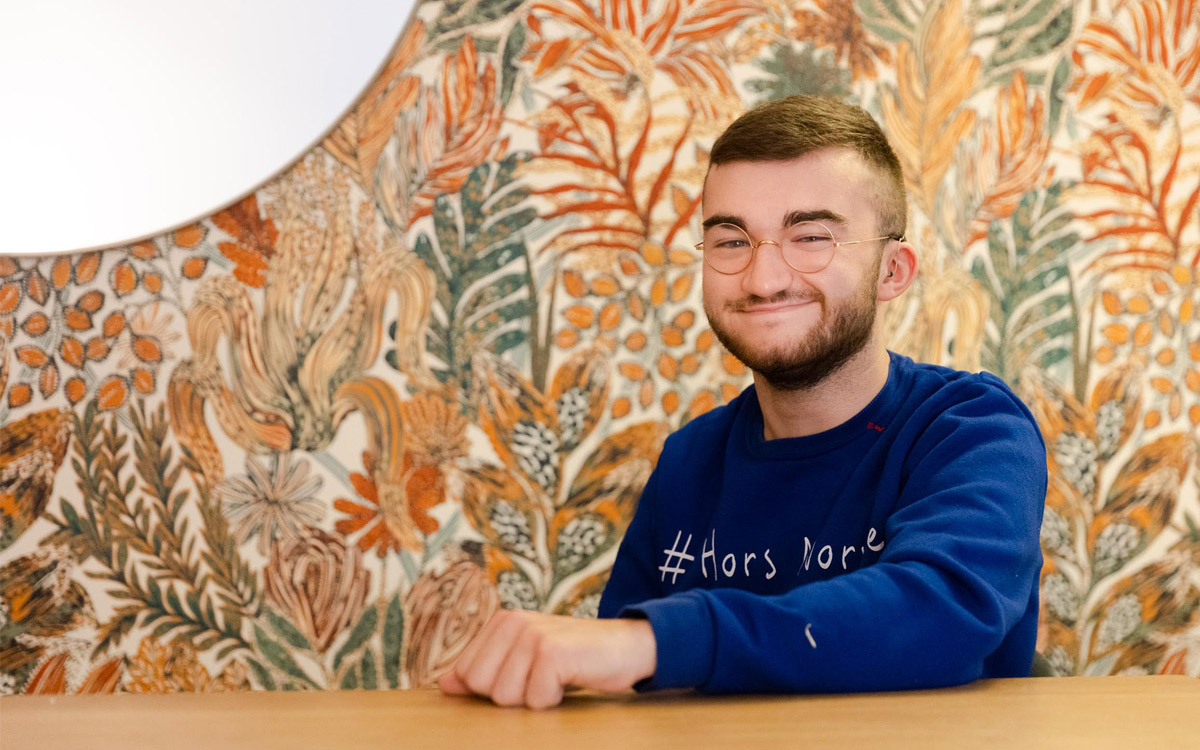Cette page est aussi disponible en français
To mark World Disability Day, the documentary "Objectif Kilimandjaro: Oscar et Arthur sur le toit de l'Afrique" (Objective Kilimanjaro: Oscar and Arthur on the roof of Africa) is being shown across France, including at the CGR - Porte des Lilas cinema (20th arrondissement), on Friday December 3 at 8pm. To take a look back at this incredible adventure, we met Arthur, who has been paraplegic since birth.
At 19, Arthur Sylvestre isn't a professional athlete, but he's already moved mountains. In October 2018, this young Breton from Morbihan joined his friend Oscar, who is also disabled, in a crazy ascent of Kilimanjaro (Tanzania). Carried by 18 volunteers from the Pompier Raid Aventure association, the two teenagers (16 and 13 years old at the time) were able to climb the highest point on the African continent (over 5,000 meters in altitude). With courage, joie de vivre and plenty of self-deprecation, Arthur recounted his adventure in a documentary directed by Dominique Barniaud.
How did the project to climb Kilimanjaro come about?
I've been a member of the Pompier Raid Aventure association since I was 10. I've already done some races with them, like the Raid du Golfe du Morbihan. It was also through this association that I met Oscar, in 2015. I immediately found this little kid really cool, and we've stayed in touch ever since. The climb is the brainchild of Oscar's mother, Anne-Laure. When she discovered his illness, she promised her son that one day she would take him to the highest point in Africa. The association's president, Jérôme, was in a position to make this dream come true with his partners. That's when I found myself included in the project. But I only knew the region by name… I later learned that the mountain in the Kirikou cartoon is Kilimanjaro!
We finally set off in October 2018, and climbed the mountain for seven days, coming down in a day and a half. It wasn't always easy, but it wasn't because of my disability. Like everyone else, I suffered from altitude sickness.
Vidéo Vimeo
What did you learn from this adventure?
I realized that when you have an experience like that, you feel you've grown up. I've always been very self-deprecating about my disability. But when I went up Kilimanjaro, my self-confidence grew. I've experienced joys and victories, but I'm always on the lookout for ways to improve. Like any young person, I'm always looking to improve. Surpassing myself is something I do every day. Today, I feel more mature than I did three years ago when I set up Kilimanjaro, because I've grown up in the meantime.
What made you feel proud about your ascension?
I'm not proud of myself, I'm proud of all of us. Above all, the project belongs to the association. Those who took part in the charity evenings, those contributed financially… All these people climbed with us, and carried us to the top. Over the years, we've grown from an association into a family.
I've had my share of joys and victories, but I'm always on the lookout for ways to improve. I'm always looking to improve
On December 3, the documentary was shown to schoolchildren, what message would you like to convey to them?
Disability aside, the message is "do what you want to do, and even if you've set your own path in life, don't be afraid to take different roads". No matter how old we are, we mustn't regret anything. And if there are things we regret, the most important thing is to have learned from our mistakes. I read this sentence somewhere, which sums up my state of mind: "Don't let a bad period make you think you're having a bad life."
In 1,000 days, the Paralympic Games kick off in Paris. What does that mean for you?
I'd love to go! Sport is an important part of my life. It's helped me accept my body and let off steam. Then there are the athletes who have carried me a lot. When I was a kid, I used to follow Michaël Jeremiasz. He was number 1 in wheelchair tennis. After a major operation, I had to spend ten months in a rehabilitation center to learn to walk again. While I was there, I read interviews with the athlete, which I found very inspiring. I'm lucky, because I can walk, but with Michaël Jeremiaz, I thought it was cool to be in a wheelchair. I've learned to accept my disability thanks to athletes. I may not be a professional athlete, but I do have a unique achievement: I've mastered walking three times with my "new legs" following my surgeries!
Objectif Kilimandjaro film screening
The documentary is shown on December 3 at the CGR - Porte des Lilas cinema (20th arrondissement), at 8pm, followed by testimonials from the two actors, Arthur and Oscar, and a discussion with the film team and Paralympic athletes. It will also be screened the same evening in 120 other cinemas across France.
For further information, click here.
For further information, click here.
We want to hear from you!
Was this information useful to you?
Please note: we cannot reply via this form (please do not include any personal information).


